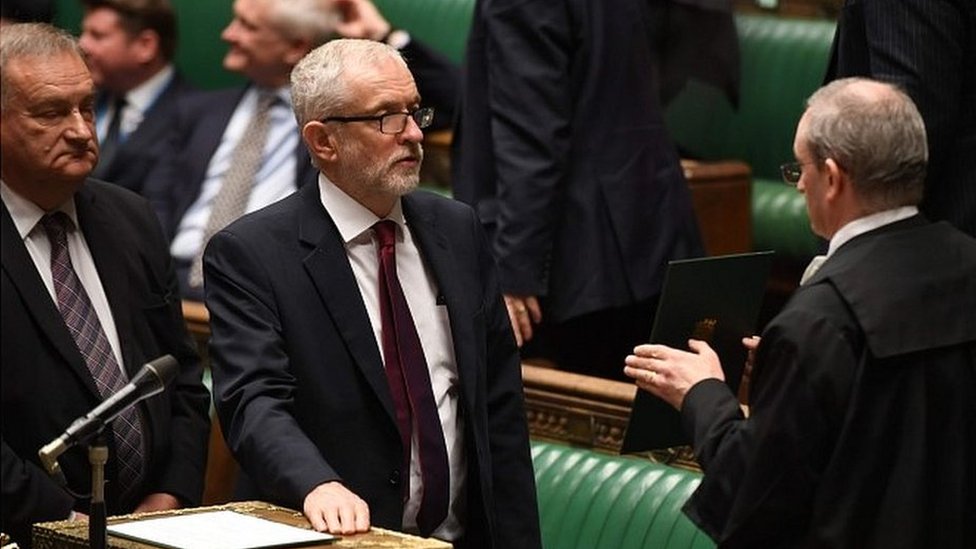Why was Jeremy Corbyn suspended from the Labour Party?
By Jennifer Scott
BBC News online political reporter
Jeremy Corbyn joined Labour 55 years ago as a teenager and led the party into the last general election.
But the Islington North MP has now been suspended, pending an investigation.
We can't tell you what the result of that will be, but we can explain why the party says the decision has been taken...
Since 2016 - a year after Mr Corbyn was elected leader - Labour has been plagued by allegations of anti-Jewish racism by some of its supporters, mostly on social media.
Anti-Semitic abuse is against the law - and in May last year the body that polices human rights and equalities in the UK launched an investigation into Labour's handling of complaints about the behaviour of some of its supporters.
On Thursday, the Equalities and Human Rights Commission published its report, saying Labour had broken the law, which you can read about here.
The Commission put some of the blame on "serious failings" under Jeremy Corbyn's leadership of the party.
But it was not the conclusion of the report that led to the former leader's suspension, says Labour.
Instead, it was his reaction to the findings.
How the suspension happened
The report was published at 10:00 GMT on Thursday. Around 30 minutes later, Mr Corbyn put out a statement.
He said anti-Semitism was "absolutely abhorrent" and "one anti-Semite is one too many" in the party.
But he then said: "The scale of the problem was also dramatically overstated for political reasons by our opponents inside and outside the party, as well as by much of the media."
After another 30 minutes or so, Mr Corbyn's successor as Labour leader, Sir Keir Starmer, made his own statement.
He said those who believed the issue of anti-Semitism in the party had been "exaggerated" or were a "factional attack" were also "part of the problem and... should be nowhere near the Labour Party".
Sir Keir told the BBC on Friday that he had informed his predecessor of what he planned to say and was "deeply disappointed" that Mr Corbyn's comments appeared to contradict his statement.
Back to Thursday, and after the new leader's speech, Mr Corbyn sat down with a TV reporter to be asked about the EHRC's findings.
He was questioned on Sir Keir's statement and whether he stood by his own response that the issue had been "dramatically overstated".
Mr Corbyn repeated that "one anti-Semite is too many", but then said the number of complaints had been "exaggerated".
Six minutes after the clip aired, Labour released a statement saying they had suspended Mr Corbyn from the party.
It read: "In light of his comments made today and his failure to retract them subsequently, the Labour Party has suspended Jeremy Corbyn pending investigation."
Sir Keir clarified on Friday morning that it was Mr Corbyn's comments about the "exaggeration" of anti-Semitism that was the main reason for his suspension.
He said it was not his decision, but that of the party's general secretary, David Evans.
However, Sir Keir said, while "difficult", it was the "right action" and he fully supported it.
Speaking after his suspension, Mr Corbyn said he would "strongly contest" what he called a "political intervention".
He added: "I've made absolutely clear that those who deny there has been an anti-Semitism problem in the Labour Party are wrong.
"It's also undeniable that a false impression has been created of the number of members accused of anti-Semitism, as polling shows: that is what has been overstated, not the seriousness of the problem."
What happens next?
Now, this is the part we are not so clear on.
We know there will now be a disciplinary procedure within the party under its governance and legal unit.
The decision of any further action against Mr Corbyn - such as expelling him from the party - or his reinstatement, will be taking by Labour's National Executive Committee, not the leadership.
After many years of having a majority on the left of the party, allies of the new leader have a slim majority on the NEC.
But Sir Keir has said he will not interfere in the process.
So, we will just have to wait to see the conclusion of the Labour Party investigation.
https://www.bbc.com/news/uk-politics-54746452


